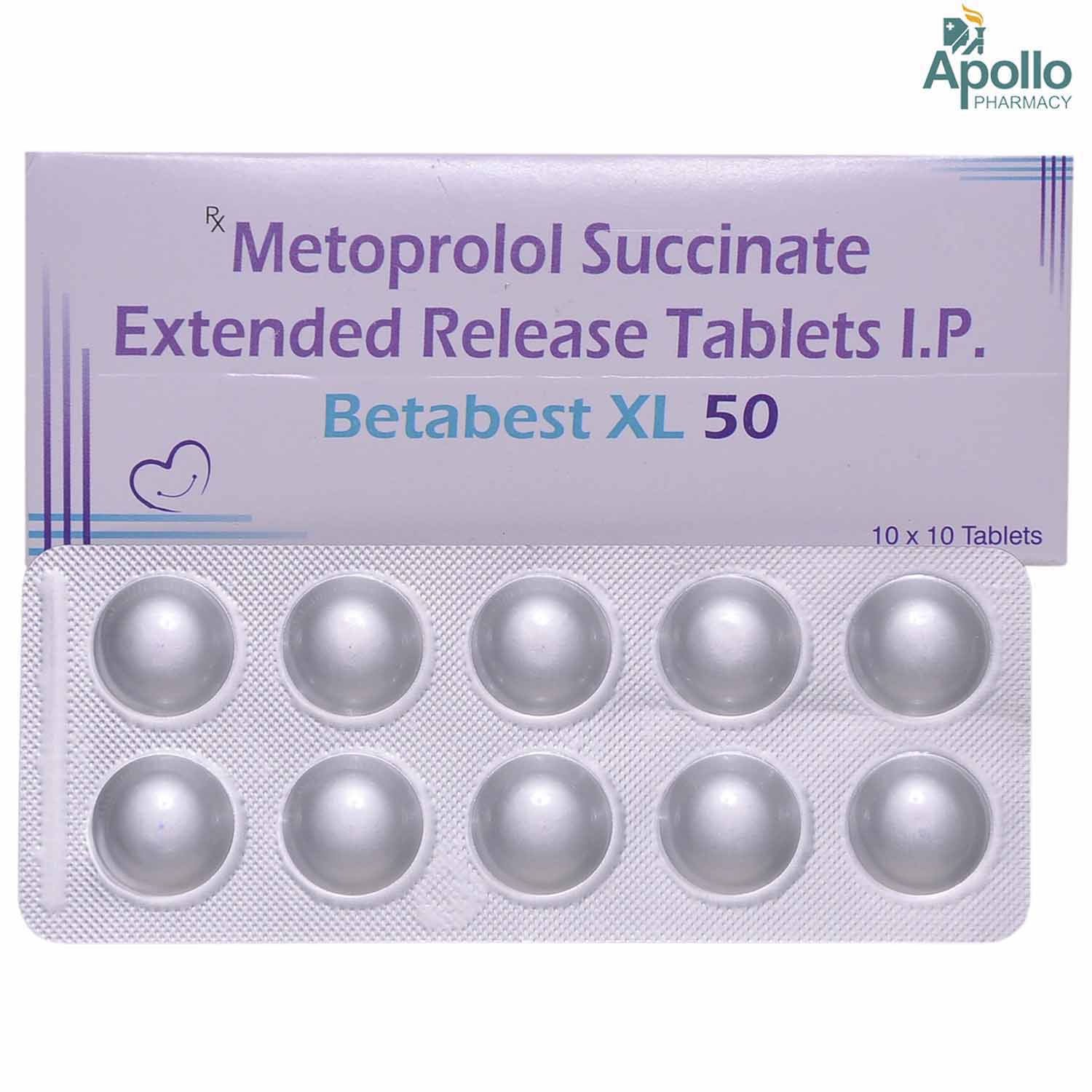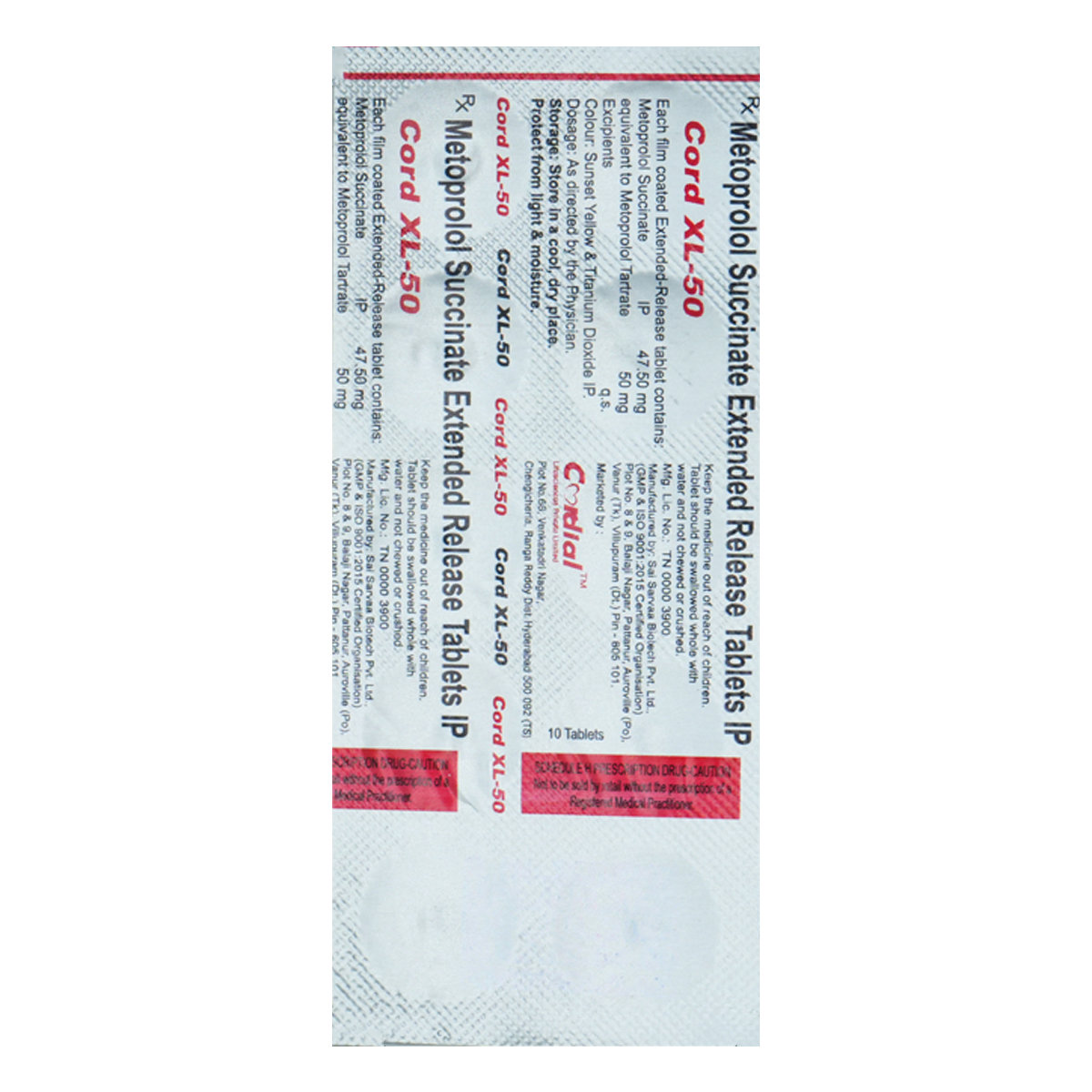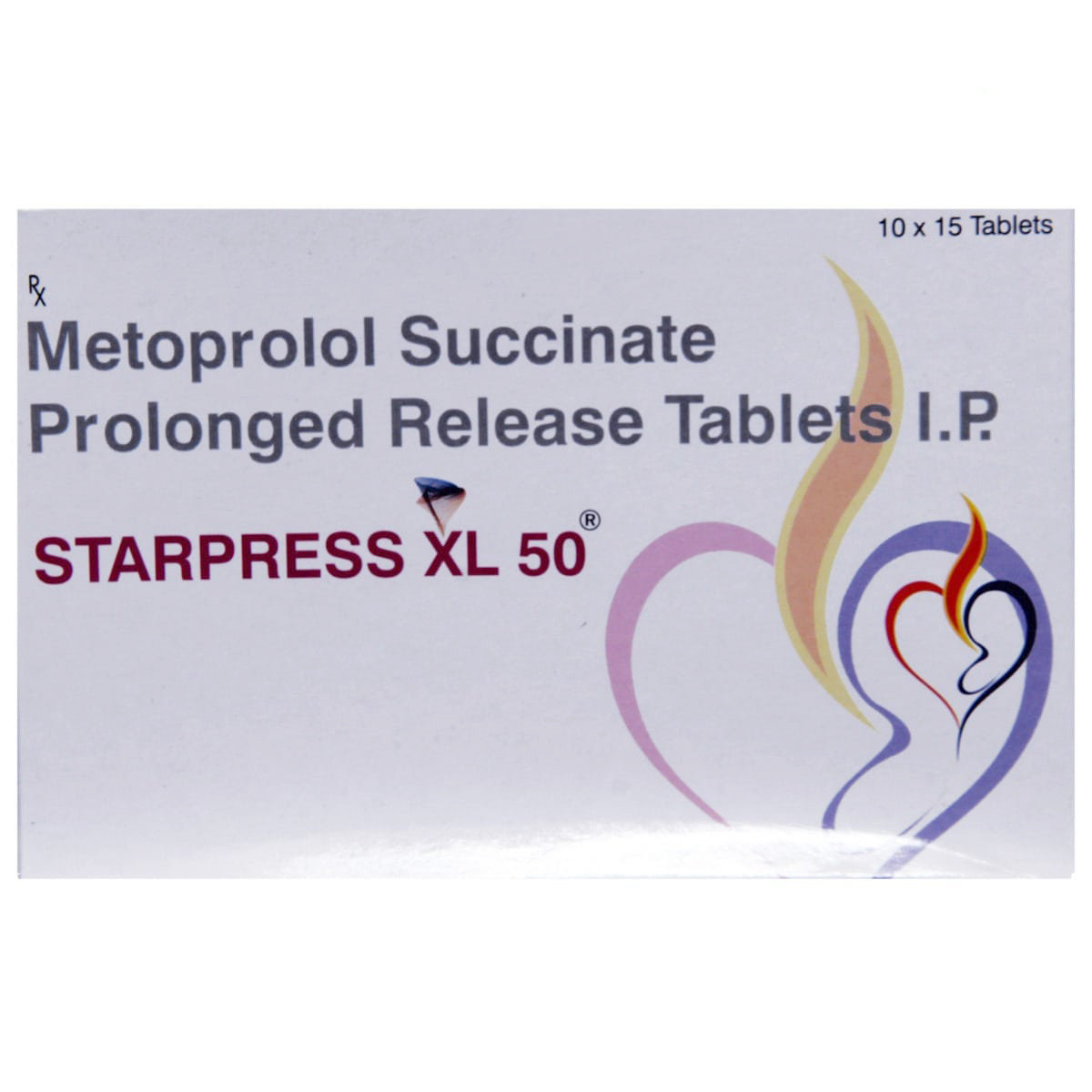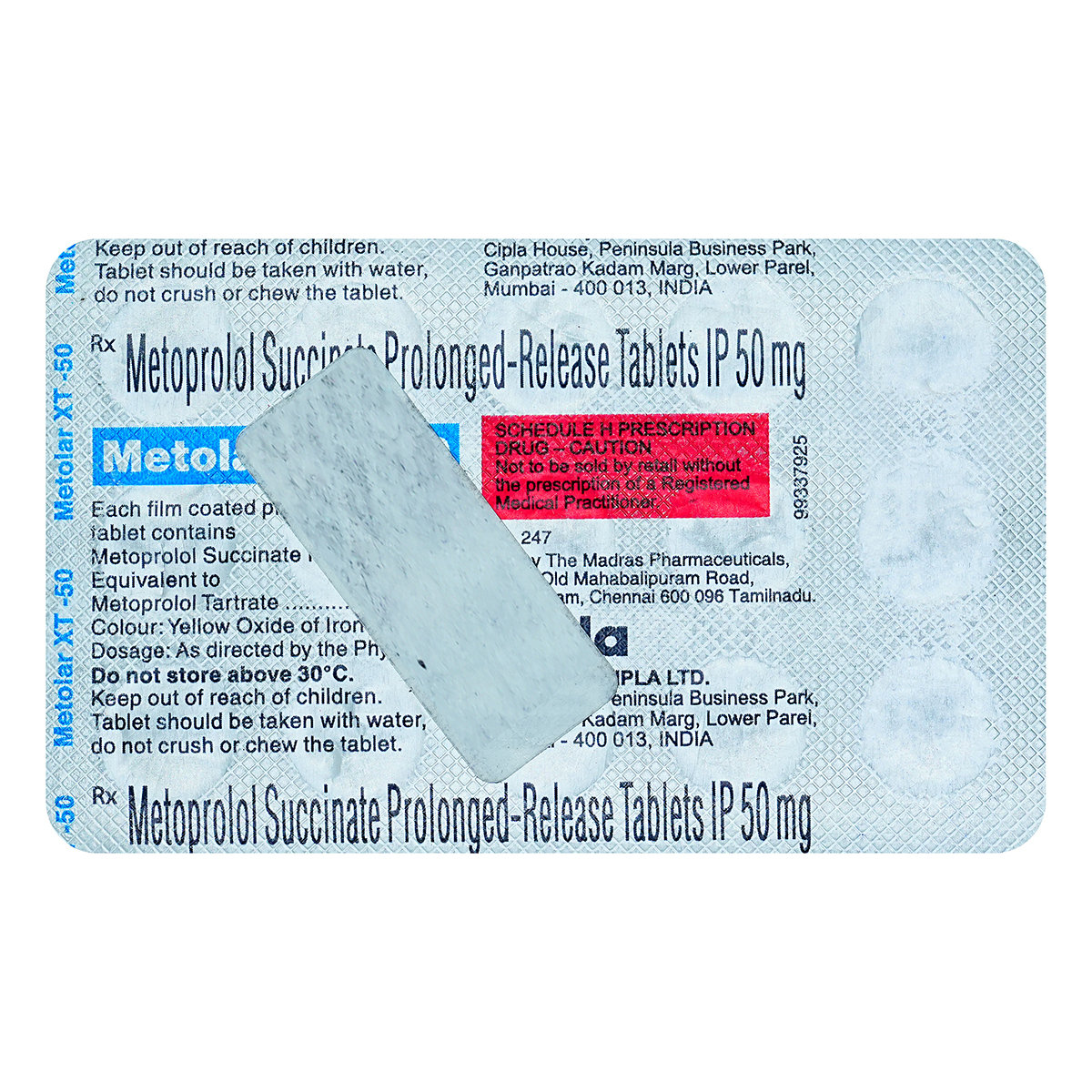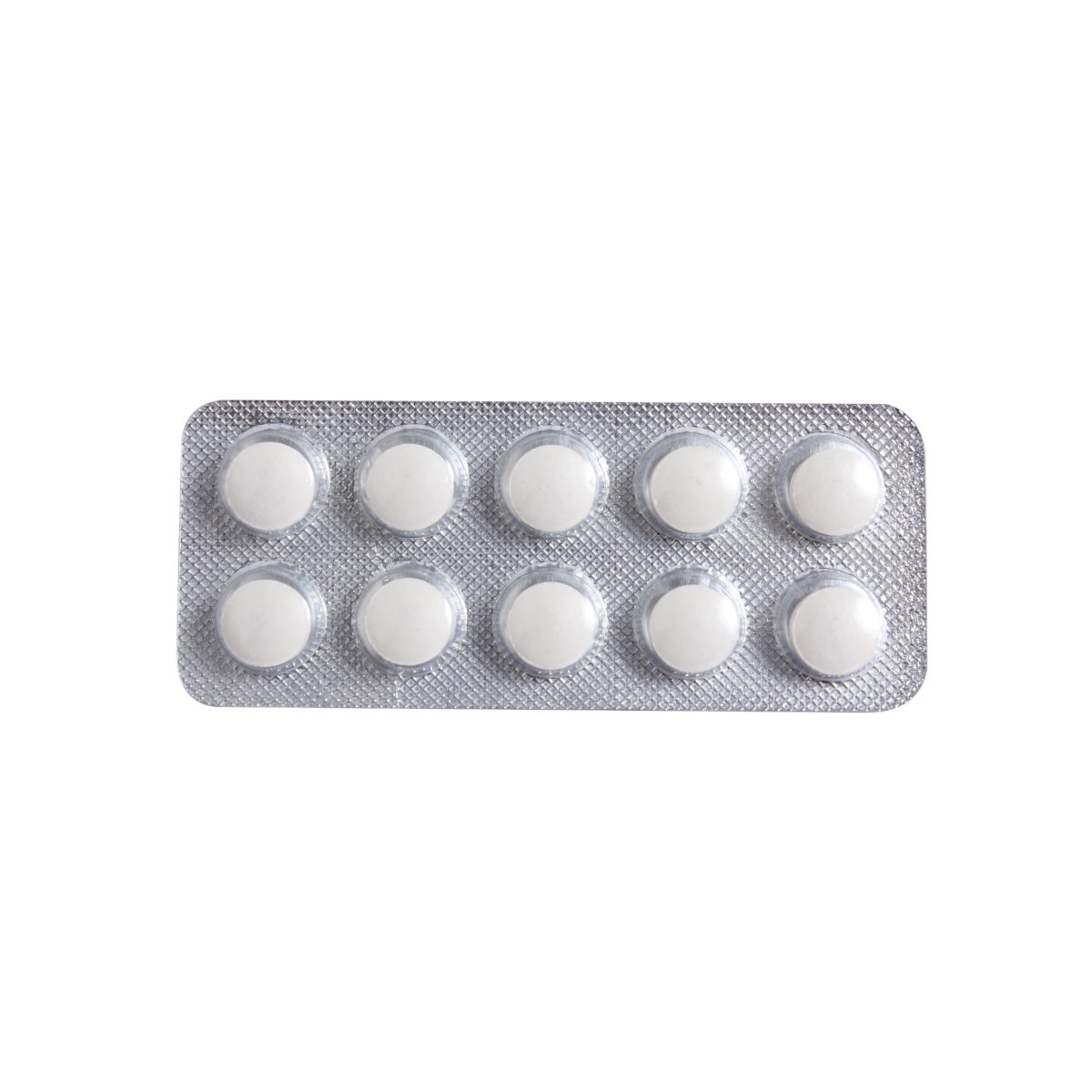Metjeel 50 XL Tablet 10's
MRP ₹66
(Inclusive of all Taxes)
₹9.9 Cashback (15%)
Provide Delivery Location
Online payment accepted
 Prescription drug
Prescription drugWhats That
Composition :
Manufacturer/Marketer :
Consume Type :
Return Policy :
About Metjeel 50 XL Tablet 10's
Metjeel 50 XL Tablet 10's belongs to a group of medicines called “Antihypertensive” used alone or together with other drugs to treat high blood pressure (hypertension), symptoms caused by an overactive thyroid gland, heart-related chest pain (angina), heart rhythm disorder (arrhythmia). Besides this, it also helps in relieving symptoms of migraine-related headaches. High blood pressure adds to the workload of the heart and arteries. Hypertension or high blood pressure is a long-term force of the blood against the arteries that may lead to various heart diseases. It can damage the blood vessels (arteries) of the brain, heart, and kidneys if it continues for a long time, resulting in a stroke, heart failure or kidney failure. Lowering blood pressure reduces the risk of stroke, heart attack and heart-related chest pain (angina).
Metjeel 50 XL Tablet 10's plays a vital role in relaxing blood vessels by blocking the action of certain natural substances in your body. It helps slow down the heart rate, making it easier for pumping more blood around the body. This lowers your blood pressure and reduces the risk of having a stroke, a heart attack, other heart problems or kidney problems in the future. Metjeel 50 XL Tablet 10's needs to be taken regularly to be effective.
You are advised to take this medicine for as long as your doctor has prescribed it for you depending on your medical condition. In some cases, you may experience certain common side effects, such as tiredness, dizziness, stomach pain, nightmares, irregular heart rate and skin rash. Most of these side effects do not require medical attention and gradually resolve over time. However, if the side effects are persistent, reach out to your doctor. However, you are advised to talk to your doctor if you experience these side effects persistently.
Don't stop taking this medicine without talking to your doctor first. Stopping abruptly may cause changes in your heart rhythm and blood pressure, cause chest pain or a heart attack. Your doctor will lower your dose gradually over a period of time to help prevent these symptoms. Metjeel 50 XL Tablet 10's should not be used to avoid heart attacks. You should not use Metjeel 50 XL Tablet 10's if you have heart rhythm problems, diabetes, kidney disease or failure, COPD (Chronic Obstructive Pulmonary Disease). Avoid driving and operating heavy machinery as it may cause dizziness and drowsiness. Orthostatic hypotension (sudden lowering of blood pressure n standing) might occur so patients using Metjeel 50 XL Tablet 10's should get up with caution. Before taking Metjeel 50 XL Tablet 10's, inform your doctor if you are going to have surgery or an anaesthetic.
Uses of Metjeel 50 XL Tablet 10's
Directions for Use
Key Benefits
Metjeel 50 XL Tablet 10's contains Metoprolol tartrate that works by blocking beta receptors, namely beta 1 and beta 2. Metjeel 50 XL Tablet 10's blocks beta 1 receptor located in the heart cells that lower heart rate and decreases the heart's blood pumping frequency decreasing raised blood pressure. On the other hand, Metjeel 50 XL Tablet 10's also blocks beta 2 receptors located in the lungs (bronchioles) and blood vessels of skeletal muscle narrowing it. This, in turn, lowers your overall body's blood pressure and helps in reducing the risk of having a stroke, heart problems, or kidney problems in the future. A Metjeel 50 XL Tablet 10's also improves heart-related chest pain (angina) and may increase a person's stamina to exercise with angina. It also blocks the effects of epinephrine, which causes the heart to beat slower. Additionally, Metjeel 50 XL Tablet 10's reduces symptoms of essential tremor (fits), and prevent migraine. Metjeel 50 XL Tablet 10's can reduce symptoms of too much thyroid hormone (thyrotoxicosis) and can be taken together with thyroid-related medicines to treat an overactive thyroid.
Storage
- Rest well; get enough sleep.
- Eat a balanced diet and drink enough water.
- Manage stress with yoga and meditation.
- Limit alcohol and caffeine.
- Physical activities like walking or jogging might help boost energy and make you feel less tired.
- Inform your doctor about dizziness symptoms. They may adjust your medication regimen or prescribe additional medications to manage symptoms.
- Follow your doctor's instructions for taking medication, and take it at the same time every day to minimize dizziness.
- When standing up, do so slowly and carefully to avoid sudden dizziness.
- Avoid making sudden movements, such as turning or bending quickly, which can exacerbate dizziness.
- Drink plenty of water throughout the day to stay hydrated and help alleviate dizziness symptoms.
- If you're feeling dizzy, sit or lie down and rest until the dizziness passes.
- Track when dizziness occurs and any factors that may trigger it, and share this information with your doctor to help manage symptoms.
- Remember, managing depression as a side effect of medication requires patience, persistence, and collaboration with your healthcare team.
- Tell your doctor about your depression symptoms to adjust medication.
- Consult a therapist or counsel for emotional support.
- Engage in regular exercise to release endorphins (neurotransmitters).
- Practice stress-reducing techniques like meditation and deep breathing.
- Build a support network of friends, family, and support groups.
- Establish a consistent sleep schedule.
- Eat a nutritious diet rich in fruits, vegetables, and whole grains.
- Limit or avoid alcohol and recreational substances.
- Keep a mood journal to track symptoms and progress.
- Exercising regularly helps lower the risk of heart problems.
- Maintain a healthy diet, including vegetables and fruits.
- Rest well; get enough sleep.
- Manage stress with yoga and meditation.
- Limit alcohol and smoking.
- If you experience low blood pressure symptoms like dizziness, lightheadedness, or fainting while taking medication, seek immediate medical attention.
- Make lifestyle modifications and adjust your medication regimen under medical guidance to manage low blood pressure.
- As your doctor advises, regularly check your blood pressure at home. Record your readings to detect any changes and share them with your doctor.
- Fluid intake plays a vital role in managing blood pressure by maintaining blood volume, regulating blood pressure, and supporting blood vessel function. Drinking enough fluids helps prevent dehydration, maintain electrolyte balance, and regulate fluid balance.
- Take regular breaks to sit or lie down if you need to stand for long periods.
- When lying down, elevate your head with extra pillows to help improve blood flow.
- Avoid heavy exercise or strenuous activities that can worsen low blood pressure.
- Wear compression socks as your doctor advises to enhance blood flow, reduce oedema, and control blood pressure.
- If symptoms persist or worsen, or if you have concerns about your condition, seek medical attention for personalized guidance and care.
- Inform Your Doctor: Notify your doctor immediately about your diarrhoea symptoms. This allows them to adjust your medication or provide guidance on managing side effects.
- Stay Hydrated: Drink plenty of fluids to replace lost water and electrolytes. Choose water, clear broth, and electrolyte-rich drinks. Avoid carbonated or caffeinated beverages to effectively rehydrate your body.
- Follow a Bland Diet: Eat easy-to-digest foods to help firm up your stool and settle your stomach. Try incorporating bananas, rice, applesauce, toast, plain crackers, and boiled vegetables into your diet.
- Avoid Trigger Foods: Steer clear of foods that can worsen diarrhoea, such as spicy, fatty, or greasy foods, high-fibre foods, and dairy products (especially if you're lactose intolerant).
- Practice Good Hygiene: Maintain good hygiene to prevent the spread of infection. To stay healthy, wash your hands frequently, clean and disinfect surfaces regularly, and avoid exchanging personal belongings with others.
- Take Anti-Diarrheal Medications: If your doctor advises, anti-diarrheal medications such as loperamide might help manage diarrhoea symptoms. Always follow your doctor's directions.
- Keep track of your diarrhoea symptoms. If they don't get better or worse or are accompanied by severe stomach pain, blood, or dehydration signs (like extreme thirst or dark urine), seek medical help.
- Report the itching to your doctor immediately; they may need to change your medication or dosage.
- Use a cool, damp cloth on the itchy area to help soothe and calm the skin, reducing itching and inflammation.
- Keep your skin hydrated and healthy with gentle, fragrance-free moisturizers.
- Try not to scratch, as this can worsen the itching and irritate your skin.
- If your doctor prescribes, you can take oral medications or apply topical creams or ointments to help relieve itching.
- Track your itching symptoms and follow your doctor's guidance to adjust your treatment plan if needed. If the itching persists, consult your doctor for further advice.
Drug Warnings
Do not take Metjeel 50 XL Tablet 10's if you are allergic (hypersensitive) to Metjeel 50 XL Tablet 10's or any ingredients present in it. Please consult your doctor before taking Metjeel 50 XL Tablet 10's if you are pregnant or planning to conceive, and breastfeeding. It should not be given to children. Don't stop taking Metjeel 50 XL Tablet 10's without talking to your doctor first. Stopping Metjeel 50 XL Tablet 10's gradually may cause changes in your heart rhythm and blood pressure, cause chest pain or a heart attack. Your doctor will lower your dose gradually over a period of time to help prevent these symptoms. Before taking Metjeel 50 XL Tablet 10's, inform your doctor if you have diabetes mellitus, liver cirrhosis, myasthenia gravis, psoriasis, or if you have a slow heart rate or blood vessel disorder. Do not take Metjeel 50 XL Tablet 10's with medicines like monoamine oxidase inhibitors (MAOIs) for depression, other blood pressure-lowering medicines such as nifedipine, verapamil, diltiazem disopyramide or quinidine (to treat irregular heartbeat). Inform your doctor about all your current ongoing medications before taking Metjeel 50 XL Tablet 10's. Do not consume alcohol while on this medication.
Drug-Drug Interactions
Drug-Drug Interactions
Login/Sign Up
Taking ceritinib together with Metjeel 50 XL Tablet can slow your heart rate and increase the risk of an irregular heart rhythm.
How to manage the interaction:
Although there is a interaction between Metjeel 50 XL Tablet and Ceritinib, but they can be taken together if your doctor has prescribed them. However, consult your doctor immediately if you experience any dizziness, lightheadedness, fainting, or irregular heartbeat. Do not discontinue any medications without consulting a doctor.
Coadministration of Metjeel 50 XL Tablet with Verapamil may lead to increased side effects.
How to manage the interaction:
Although there may be an interaction, Metjeel 50 XL Tablet can be taken with Verapamil if prescribed by the doctor. Consult a prescriber if you experience fatigue, headache, fainting, swelling of the extremities, weight gain, shortness of breath, chest pain, increased or decreased heartbeat, or irregular heartbeat. Do not discontinue any medications without a doctor's advice.
Coadministration of Aminophylline with Metjeel 50 XL Tablet together can make Metjeel 50 XL Tablet less effective and increase the effects of aminophylline.
How to manage the interaction:
Taking Aminophylline with Metjeel 50 XL Tablet may lead to an interaction, it can be taken only if a doctor has advised it. If you experience nausea, vomiting, sleeplessness, restlessness, irregular heartbeats, or difficulty in breathing, contact a doctor immediately. Do not discontinue any medications without consulting a doctor.
Coadministration of Acebutolol with Metjeel 50 XL Tablet can cause abnormal heart rhythm.
How to manage the interaction:
Taking Metjeel 50 XL Tablet and Acebutolol together can possibly result in an interaction, it can be taken if your doctor has advised it. However, if you experience blurry vision, confusion, dizziness, fainting, lightheadedness, nausea or vomiting, contact your doctor immediately. Do not discontinue any medications without consulting a doctor.
Co-administration of Clonidine and Metjeel 50 XL Tablet may lower blood pressure and slow the heart rate.
How to manage the interaction:
Although there is a possible interaction between Clonidine and Metjeel 50 XL Tablet, you can take these medicines together if prescribed by your doctor. However, if you experience headaches, slow heartbeat, dizziness, or feeling like you might pass out, contact your doctor. Do not stop using any medications without first talking to your doctor.
Coadministration of Metjeel 50 XL Tablet and Tizanidine may reduce the efficiency of Metjeel 50 XL Tablet.
How to manage the interaction:
Taking Metjeel 50 XL Tablet and Tizanidine together can possibly result in an interaction, it can be taken if your doctor has advised it. However, if you experience blurry vision, confusion, dizziness, fainting, lightheadedness, nausea or vomiting, contact your doctor immediately. do not discontinue any medications without talking to your doctor.
Using Metjeel 50 XL Tablet and Saquinavir can increase the risk of an irregular heart rhythm.
How to manage the interaction:
There may be a possible interaction between Metjeel 50 XL Tablet and Saquinavir, but they can be taken together if your doctor has prescribed them. However, consult a doctor immediately if you experience dizziness, lightheadedness, fainting, slow pulse, or irregular heartbeat. Do not discontinue any medications without consulting a doctor.
Both Metjeel 50 XL Tablet and Artemether may increase the blood levels and effects of Metjeel 50 XL Tablet activity.
How to manage the interaction:
Taking Metjeel 50 XL Tablet and Artemether together can possibly result in an interaction, it can be taken if your doctor has advised it. However, if you experience blurry vision, confusion, dizziness, fainting, lightheadedness, nausea or vomiting, contact a doctor immediately. Do not discontinue any medications without consulting a doctor.
Use of Metjeel 50 XL Tablet with Atazanavir may increase the risk of an irregular heart rhythm.
How to manage the interaction:
Although there may be an interaction between Metjeel 50 XL Tablet and Atazanavir, it can be taken if prescribed by the doctor. Consult the doctor if you experience dizziness, lightheadedness, fainting, or irregular heartbeat, contact your doctor immediately. Do not discontinue any medications without consulting a doctor.
Coadministration of Metjeel 50 XL Tablet with Diltiazem can increase the side effects.
How to manage the interaction:
Although there is a possible interaction between Metjeel 50 XL Tablet and Diltiazem, you can take these medicines together if prescribed by your doctor. Consult your doctor immediately if you experience fatigue, headache, fainting, swelling of the extremities, weight gain, shortness of breath, chest pain, increased or decreased heartbeat, or irregular heartbeat. Do not discontinue any medications without consulting a doctor.
Drug-Food Interactions
Drug-Food Interactions
Login/Sign Up
Diet & Lifestyle Advise
- Keep your weight under control with BMI 19.5-24.9.
- Do regular physical activity or exercise for at least 150 minutes per week, or about 30 minutes most days of the week.
- Doing this can help you to lower your raised blood pressure by about 5 mm of Hg.
- Option for a diet rich in whole grains, fruits, veggies, and low-fat dairy products.
- Limit intake of sodium chloride (table salt) in your daily diet to 2300 mg per day or less than 1500 mg is ideal for most adults.
- If you are taking alcohol, then only one serving for women and two servings for men is advisable.
- Quitting smoking is the best strategy to lower the risk of heart disease.
- Avoid chronic stress as it can raise your blood pressure. Try to enjoy and spent time with your loved ones to cope with stress and practice mindfulness techniques.
- Monitor your blood pressure daily and if there is too much fluctuation, then immediately contact your doctor.
- Try to include heart-healthy omega 3 fatty acid containing food drinks in your daily diet. You can also use low-fat cooking oil like olive oil, soybean oil, canola oil, and coconut oil to lower your elevated blood pressure.
Side Effects of Metjeel 50 XL Tablet 10's
- Tiredness
- Dizziness
- Headache
- Stomach pain
- Anxiety
- Irregular heart rate
Habit Forming
Therapeutic Class
All Substitutes & Brand Comparisons
RX
Betabest XL 50 Tablet 10's
Medley Pharmaceuticals Ltd
₹44
(₹3.96 per unit)
33% CHEAPERRX
Mitolol-XL 50 Tablet 15's
Vaks Pharma Pvt Ltd
₹75
(₹4.5 per unit)
24% CHEAPERRX
METAPRO 50MG TABLET
Micro Labs Ltd
₹52
(₹4.68 per unit)
21% CHEAPER
Drug-Diseases Interactions
Drug-Diseases Interactions
Login/Sign Up
FAQs
Drug-Drug Interactions Checker List
- ISOCARBOXAZID
- LINEZOLID
- PHENELZINE
- RASAGILINE
- SELEGILINE
- TRANYLCYPROMINE
- DIHYDROERGOTAMINE
- ERGOTAMINE
- HYDRALAZINE
- CLONIDINE
- PRAZOSIN
- CIMETIDINE
- MEFLOQUINE
- ERGONOVINE
- METHYLERGONOVINE
Special Advise
- Metjeel 50 XL Tablet 10's can hide symptoms of low blood sugar if you have diabetes. Monitor your blood sugar levels regularly.
- Do not stop taking Metjeel 50 XL Tablet 10's suddenly as it can cause your blood pressure to rise suddenly, thereby increasing the risk of heart attack and stroke.
Disease/Condition Glossary
Hypertension: High blood pressure is a chronic condition when the blood pressure and the heart's workload is too high. This condition can lead to hardened arteries (blood vessels), decreasing the blood and oxygen flow to the heart. Raised blood pressure can cause chest pain (angina) and heart attack (when blood supply to the heart is blocked). Additionally, high blood pressure also causes brain damage (stroke) and kidney failure. High blood pressure can be diagnosed with the help of a blood pressure monitor or sphygmomanometer. Systolic pressure is the pressure when the heart pumps blood out. On the other hand, diastolic pressure is when your heart is at the resting stage between heartbeats. If your blood pressure is 140/90 mm of Hg, it means the systolic pressure is 140 mm of Hg and, diastolic pressure is 90 mm of Hg. Ideal blood pressure should be between 90/60 mm of Hg and 120/80 mm of Hg.

Have a query?
Alcohol
Safe if prescribed
Drinking alcohol may increase tiredness, lower blood pressure causing dizziness or drowsiness. So avoid its intake with Metjeel 50 XL Tablet 10's.
Pregnancy
Consult your doctor
Metjeel 50 XL Tablet 10's is not recommended during pregnancy unless your doctor considers it essential. Your doctor will weigh the benefits and any potential risks before prescribing it to you.
Breast Feeding
Consult your doctor
Metjeel 50 XL Tablet 10's is not recommended if you are breast-feeding women unless your doctor considers it essential. Your doctor will weigh the benefits and any potential risks before prescribing it to you.
Driving
Safe if prescribed
You may experience dizziness, tiredness, or blurred vision while taking Metjeel 50 XL Tablet 10's. So, it is not recommended to drive, use machinery, or perform other tasks.
Liver
Consult your doctor
Metjeel 50 XL Tablet 10's is not recommended in patients with liver disease or failure. Your doctor may prescribe Metjeel 50 XL Tablet 10's depending on your condition.
Kidney
Consult your doctor
Metjeel 50 XL Tablet 10's is not recommended in patients with kidney disease or failure. Your doctor may prescribe Metjeel 50 XL Tablet 10's depending on your condition.
Children
Safe if prescribed
The safety and efficacy of Metjeel 50 XL Tablet 10's in children have not been established.




